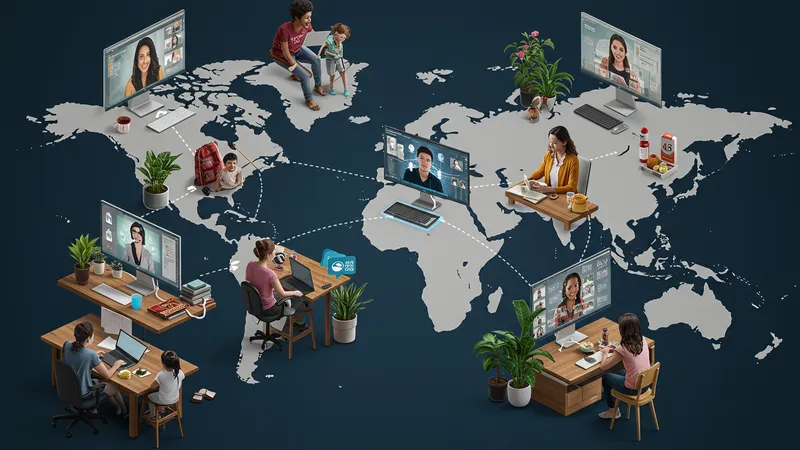

Did you know that the rise of work-from-home jobs has transformed the global job market faster than anything else in recent history? This shift is drastically altering everything from daily commutes to work-life balance, impacting industries at a core level.
With technology and remote work tools advancing rapidly, working from home has never been this crucial. The pandemic has accelerated this change, making it imperative for professionals to adapt or risk being left behind in a work-from-anywhere world.

Many still believe working from home is just a temporary fix or a flexible perk. But here’s the kicker: data shows remote jobs have become a cornerstone of modern employment strategy, with companies like Google and Twitter announcing long-term or even permanent remote positions. Some experts argue that the future of remote work will render traditional offices obsolete, given the immense cost savings on real estate. But that’s not even the wildest part…
Contrary to the belief that home offices lack professionalism, studies have found that remote workers often display increased productivity compared to their office-bound counterparts. Without the usual office distractions and with more personalized work environments, employees are reportedly achieving more in less time. What’s more, companies are witnessing a broader talent pool, no longer limited by geography. Imagine recruiting the perfect candidate from anywhere on the globe—no relocation needed! But what happens next shocked even the experts…
Remote work isn’t just a fleeting trend—it’s a revolution that’s just beginning. Studies reveal that nearly 90% of remote employees never want to return to a traditional office setting. This widespread shift stems from the freedom and flexibility remote work provides, which translates into a healthier work-life balance. Companies that understand and support this will have a competitive edge in the talent market. The allure of being location independent cannot be understated. But there's one crucial element that makes remote work downright irreplaceable...

In addition to flexibility, remote work allows companies to significantly cut costs. Imagine slashing expenses associated with maintaining office spaces—from utilities to real estate costs. Organizations have reported savings in the millions, enabling them to reinvest those funds into employee benefits and cutting-edge technology. Not only does this enhance employee satisfaction, but it also boosts innovation and growth within the company. Yet, even with all these advantages, there's a side of remote work that's rarely discussed...
Security and data protection have become paramount concerns in the age of remote work. With employees accessing sensitive information from home, businesses are investing heavily in cybersecurity measures. Tools and protocols that ensure secure data exchange are now standard practice, reflecting the seriousness with which companies are adapting to this new landscape. Surprisingly, this need for enhanced security has led to innovations few foresaw—reshaping industries at their very core. But what you read next might change how you see this forever...
In an unexpected twist, the environmental impact of remote work could be its most important legacy. The reduction in commuting and office energy consumption significantly cuts down carbon emissions, contributing to a greener planet. As more companies adopt this model, the cumulative environmental benefits could rival major global initiatives aimed at combating climate change. This aspect of remote work could redefine how industries approach sustainability. What if I told you there's another change on the horizon, one even bigger than all these combined? Stay with us to find out...
The psychological landscape of work has shifted dramatically due to remote work environments. Gone is the daily grind of rushed mornings and stressful commutes, replaced with a pace that many find more manageable and conducive to mental health. Studies indicate that workers suffer less from burnout when they have control over their schedules. But here's the twist: some are finding isolation and lack of social interaction to be a new source of stress, igniting debates on office culture’s importance. How companies address these needs might surprise you...

The mental health conversation is shifting inside the corporate world. With workers dispersed across various locations, there is a growing movement towards proactive mental health support and virtual team-building activities. This shift highlights the pivotal role that emotional well-being plays in remote work setups. As companies innovate in this space by introducing mental health days and virtual hangouts, they're also mapping uncharted emotional territories. But wait until you hear how some companies are going above and beyond...
Virtual reality might just be the next frontier for remote work connectivity; some companies are dabbling in VR office spaces that mimic real-world interactions. Imagine turning your living room into a boardroom at the switch of a button, complete with customizable immersive environments! But beyond the cool tech, this innovation points towards increasingly creative solutions to foster team spirit remotely. What’s truly groundbreaking is the collaboration between tech firms to create these futuristic experiences. And there's more to this experiential evolution…
A new work-from-home trend is emerging, emphasizing a blend of remote work with occasional office days. Known as a "hybrid model," it's carving out a space for structure and spontaneity, allowing employees to enjoy the best of both worlds. Adopted by major companies like Microsoft, this model caters to workers' need for flexible schedules while maintaining some level of physical collaboration for projects that benefit from in-person brainstorming. However, the real surprise lies in the model’s unexpected added perk…
If you think remote work's impact stops at individual companies and their employees, think again. Its economical ripple is being felt far beyond, reshaping gig economies, local businesses, and city planning. As more people work remotely, there's less demand for inner-city office spaces, massively affecting local businesses that depended on office workers. Cafes, lunch spots, and public transport systems face unique challenges, driven by the home-based workforce changes. The magnitude of these shifts is just beginning to surface...

In fact, many suburban and rural areas are experiencing unexpected growth due to the exodus of remote workers seeking more spacious living. This demographic shift rejuvenates communities once waning, bringing new opportunities and challenges alike. Local economies are adapting by welcoming these new residents with services tailored to meet a more diverse population’s needs. But the full extent of these developments is often overlooked in mainstream discussions on remote work. Wait till you see the full picture...
With the decreased need for massive urban office spaces, commercial real estate industries face a disruption of epic proportions. But rather than resist change, some areas are creatively repurposing these vacant spaces. Think urban farms, cultural hubs, or creative startups moving into once-corporate zones. It’s a time of significant transition and those who innovate will thrive. The surprising stories of transformations in businesses are becoming more frequent. There's another layer to this story that could redefine how we see communities...
It's worth mentioning the increase in remote work-related services that have flourished. These include everything from digital communication platforms to delivery services that cater to home offices' unique needs. The creation of remote-specific services catalyzes new economic growth areas, showcasing how adaptable industries can be. The innovations developing from this surge mark only the beginning of a new age of working. But what comes next might just catch you off guard...
The infrastructure supporting remote work is a tech marvel, continuously evolving to address emerging challenges. From powerful internet services to sophisticated cloud storage solutions, the backbone of remote work relies on cutting-edge technology. Cloud platforms like AWS allow businesses to scale effortlessly, opening pathways to innovation without the constraints of traditional setups. Surprisingly, this adaptability creates opportunities more transformative than first imagined...

Artificial intelligence has become an invaluable component in managing remote workflows. AI scheduling tools, virtual assistants, and automated task management systems help streamline operations. These technologies not only improve efficiency but significantly reduce human error, making remote operations smoother. Even more fascinating is how AI facilitates personalization in virtual settings, offering experiences tailored to individual worker preferences. Imagine a future where AI anticipates every need. But that’s just the beginning...
The rise of 5G is set to further revolutionize remote work, providing super-fast and reliable internet connectivity worldwide. This advancement could eliminate current geographical barriers entirely, truly enabling a global workforce equipped to operate at unprecedented speeds. With 5G on the horizon, the potential for real-time collaboration is expansive, hinting at a remarkable shift in how we understand global workforce collaboration. But the tech revolution does not stop there...
Emerging cybersecurity solutions are essential to protect valuable company assets, as remote environments can be more vulnerable. From encrypted networks to advanced authentication protocols, these measures safeguard against threats, ensuring peace of mind for remote workers and businesses alike. Companies are investing heavily in these advancements, aiming to stay a step ahead of cybercriminals. Don't underestimate the implications of secure remote work—it's reshaping trust and efficiency. What’s coming next could take shape in a way no one expects...
Adapting company culture to fit a remote framework is not only possible but vital. Establishing a supportive and inclusive remote culture keeps employees engaged and aligned with company values despite the physical distance. Interactive virtual events, regular feedback sessions, and digital camaraderie through shared hobbies are just a few ways companies nurture their cultures virtually. But the intricacy of maintaining connection remotely goes deeper than it seems...

Many companies are now implementing "digital-first" strategies, ensuring all meetings and documentation are accessible online even if they include office-based participants. This approach would have been radical a decade ago, but is essential today. The blend of different communication tools fosters inclusivity while ensuring barriers to information are dismantled. This transformation highlights the adaptability required to thrive in remote ecosystems. But is there more to these strategies than meets the eye?
Employee engagement is drastically improving as remote models redefine traditional management roles. Without the reliance on physical presence, leaders focus on results-driven approaches, measuring success by outcomes, not hours spent at a desk. This results-oriented perspective empowers employees, giving them autonomy and fostering innovation. Ultimately, this shift cultivates trust, encouraging teams to rise to challenges without the constant oversight typical of office settings. Yet, there’s another layer to be uncovered...
The future of remote work depends heavily on the evolution of leadership styles. As managers embrace emotional intelligence and virtual mentorship, they shape a landscape where both internal promotions and collaborations across departments flourish. Such advancement creates a culturally rich workplace, propelling companies towards uncharted levels of success. Leaders who navigate this dynamic effectively set the tone for the future. Next, you'll discover a trend that’s changing the way organizations function...
The evolution of home offices is inspiring creativity among workers, leading to innovative designs that prioritize comfort and efficiency. These personalized settings elevate productivity, as individuals tailor their environments to best suit their working habits and preferences. The freedom to design brings an aesthetic and functional aspect to workspaces that traditional offices can't replicate. But there's another development within these homes that warrants attention...

Sustainable workspaces have gained traction, as remote workers increasingly choose eco-friendly furniture and energy-efficient gadgets. This shift demonstrates an awareness of environmental impact, blending personal well-being with global consciousness. The trend redefines consumer responsibility and adds deeper implications for product markets striving to keep up with demand. Expect to see a wave of home office innovations rolling out soon...
With the design boom comes a rise in professional consulting services dedicated to creating optimal home workspaces. These experts offer tailored solutions that take size, light, noise, and ergonomic factors into account, ensuring environments that boost health and productivity. Interestingly, these consultancy roles open up new career pathways and business opportunities. But what emerges from this is not just a design trend...
Increasingly, homes are being designed with designated office spaces in mind, reflecting a paradigm shift towards integrating work-life balance into domestic architecture. This architectural evolution prioritizes function without compromising on aesthetics, resulting in a living space that seamlessly blends with professional needs. The design and building industries are responding robustly with innovative layouts and features. But the positive impacts of this trend go further than just workspace design...
Remote work has recalibrated social interactions, reshaping both professional partnerships and personal relations. As colleagues become accustomed to virtual interfaces, opportunities for new forms of collaboration arise, bridging time zones and cultural divides. This evolution fosters a more globalized workforce and enriches professional networks. The ripple effects extend beyond professional life...

The boundaries between personal and professional interactions are blending, carving out a new socially intricate landscape. With more people working from home, family dynamics are shifting, bringing both challenges and opportunities for deeper connections. Balancing work responsibilities with familial duties requires nuanced approaches to time management, ushering in a new era for domestic life. However, this inclusive approach holds deeper societal implications...
Virtual communities are flourishing as remote workers seek connection and community in online spaces. Networking events, hobby clubs, and even workout classes are transcending their brick-and-mortar limitations, offering a plethora of options to connect meaningfully over digital channels. This rise of virtual communities is a testament to human adaptability and the innate desire for connection, despite physical separation. It's a reinvention worth noting...
Digital exclusion presents a critical challenge, with unequal access to technology hindering some from fully participating in the remote work revolution. Addressing this disparity presents opportunities for social improvement as global initiatives and government policies aim to bridge these gaps. The drive to ensure inclusivity and equal opportunity is inspiring changes on a societal level. Could resolving this dilemma help manifest broader change in remote work accessibility?
As remote work becomes the norm, educational institutions are evolving to prepare future generations for a decentralized work world. Curriculums increasingly focus on digital literacy, virtual collaboration skills, and self-motivation techniques. Students gain insights vital for thriving in a remote workplace, where traditional classroom skills alone won't cut it. But the shift in education doesn't stop there...

The adoption of hybrid learning models—combining online and in-person teaching—mirrors the workplace transition. These models capitalize on the strengths of both methods, fostering flexible, adaptable learners ready for multifaceted work environments. This paradigm shift is influencing how educational systems prioritize learning outcomes, potentially shaping future employment patterns. But there's more to this educational evolution...
Industry partnerships with educational institutions are burgeoning, offering job shadowing and internship opportunities within digital-first companies. This collaboration ensures that the curriculum is relevant and aligned with industry needs, providing students with practical experience and early exposure to professional environments. These partnerships represent a step towards bridging the gap between education and employment. However, the innovations don't end here...
There's a growth in certification programs focused on remote work specialties, from cybersecurity to remote project management, addressing the evolving skills needed in a digital economy. As these programs gain recognition, they challenge traditional degree pathways by offering targeted, efficient learning tailored to market demands. This represents a new era of professional development and lifelong learning. What emerges from this shift could change career landscapes forever...
A breaking wave of remote work advocates is driving policy changes and innovation. These champions of flexibility and digital autonomy are influential across various sectors, advocating for norms that prioritize employee well-being. Their voices drive crucial conversations surrounding fair labor practices, shining a spotlight on the unique needs of remote workers. But their goals reach beyond personal gain...

Work-from-home policies are evolving to encompass a wider range of employee benefits. Advocates push for enhanced health coverage, home office allowances, and stronger job security to protect remote workers’ rights. As negotiations continue, they reshape what employment benefits can look like, making remote work attractive not only to employees but to employers seeking to attract top talent. There’s more to their impact than meets the eye...
These advocates also emphasize the importance of inclusivity, ensuring remote work is accessible to individuals with disabilities or those living in remote regions. Their work calls for technological advancements and digital accessibility standards that open opportunities for diverse demographics. This movement stands to revolutionize the workforce by creating genuinely inclusive environments. Yet, they envision an even broader future...
Community-building initiatives led by remote advocates are fostering networks that support workers on a global scale. These communities offer mentorship, professional development, and shared resources, lighting the path towards a sustainable and fulfilling remote work future. The sense of unity not only assists individuals but strengthens the movement collectively. What unfolds next could redefine advocacy in a digitally connected world...
The integration of remote work into global markets is catalyzing economic shifts, requiring businesses to rethink their strategies. Once reliant on physical presence, sectors like marketing, retail, and services are experiencing disruption. They rely on digital transformation to maintain relevance and competitiveness in a remote-centric world. The shifts felt today are just the beginning...

Remote work, by facilitating broader geographical employment, is enabling greater cultural exchange. Companies gain access to diverse skill sets and perspectives, enhancing innovation and creativity. This cultural infusion creates rich experiences and products that resonate widely, offering fresh value propositions to consumers. The benefits of a diverse workforce are just now coming to light...
Freelance and gig economies are thriving as remote work settings offer more flexibility and autonomy. Individuals are capitalizing on their talents by taking freelance jobs that suit their schedules, leading to an increase in entrepreneurial activity. This autonomy challenges traditional job security models but opens new vistas for creative pursuits and income streams. And the evolution of these economies is just unfolding...
International collaboration among businesses is skyrocketing, as remote work dissolves physical and temporal boundaries. Companies are forming partnerships across continents, broadening their influence and bolstering economies. The global marketplace stands to expand even further as connectivity deepens, hinting at boundless possibilities. What happens next could redefine international commerce entirely...
For individuals, remote work offers unparalleled opportunities for personal growth. The self-discipline required fosters greater responsibility and time management skills, while expanding possibilities for work-life integration. Many find themselves exploring personal interests alongside professional duties, leading to more balanced lives. The scope for development continues to widen...

Access to online learning platforms enables workers to enhance their skills or pivot careers entirely. The vast array of courses empowers employees to upskill and remain competitive, particularly in rapidly evolving industries. This mode of learning emphasizes flexibility and personal agency in shaping one’s career path. But the empowerment remote work provides goes beyond education...
Networking opportunities have mushroomed with remote work settings turning previously inaccessible contacts into reachable allies. Professional relationships are forged across digital landscapes, majorly expanding professional networks. These connections become valuable resources, advancing careers in ways previously hindered by geographic restrictions. But there's more to this network growth...
Personal development extends to mental and physical well-being, with remote workers enjoying increased leisure time for exercise and mindfulness practices. This increased focus on health benefits productivity, leading to a healthier workforce overall. As this trend continues, its impact could lead to widespread improvements in quality of life. What comes next could revolutionize personal growth ambitions...
The work-from-home era is reshaping family dynamics significantly, allowing parents more involvement in daily home life. From attending school events to engaging in early evening family activities, work flexibility is bridging once common lifestyle gaps. This new harmony is transforming family interactions profoundly. But its effects reach further...
With parents working remotely, traditional norms around household roles are evolving, leading to more equitable sharing of domestic duties. This egalitarian approach to home management breaks down long-standing gender roles, fostering a more balanced home environment. It's an exciting shift that challenges conventional family structures, with implications that may far outlast the trend itself...
As the home becomes a focal point for both work and family, architectural designs are adapting, moving away from single-purpose rooms. Modern homes are incorporating adaptable spaces that cater to the diverse needs of families balancing work, education, and relaxation under one roof. These innovations encourage a holistic approach to living spaces and hold significant appeal. But the effects of these changes are only beginning to manifest...
The increased family time remote work affords can strain relationships if not carefully managed. Establishing boundaries and clear communication within the home is essential for maintaining harmony and ensuring the needs of all family members are met. These new relationship dynamics offer both challenges and rewards, signaling a shift towards more conscious familial interactions. Discover the unexpected transformations in family dynamics emerging from this evolution...
The shift toward remote work has not just changed how we perceive employment but has transformed societies, economies, and individual lives in unprecedented ways. Whether through the increased flexibility workers enjoy, the broadening global job market, or the deepening commitment to sustainability, remote work’s ripple effect is widespread—and it shows no signs of slowing down. As we move forward, the question remains: how will we continue to adapt to these changes, and what surprises does the future hold in this ever-evolving workscape?
This transformation presents unparalleled opportunities to redefine success, embrace diversity, and foster innovation like never before. The possibilities for growth, both personal and professional, are boundless. Understanding these dynamics equips us for a future rich with creativity and collaboration, urging each of us to become active participants in this new era. Will you step up and shape the landscape with us? If this peek into the profound transformation of work-from-home has sparked your curiosity, share this journey with others, bookmark it, and join the conversation that's reshaping the future of work.